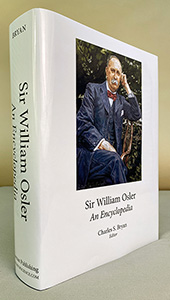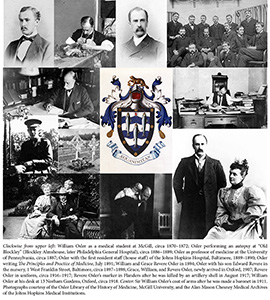Publications Sir William Osler


Sir William Osler: An Encyclopedia
Edited by Charles S. Bryan
$125.00
970pp. plus 22 pages of front matter. 624 illustrations. 8½" × 11". Cloth, dust jacket, acid-free paper. ISBN 978-0-930405-91-5. 2020. 45472.
» Skip to: About the Editor | Reviews
Sir William Osler (1849–1919) was the most famous and best-loved physician in the English-speaking world during the early twentieth century. Some consider him “the greatest physician of all time” or “the father of modern medicine.” More commonly, he is seen as an avatar of humanism in medicine. The 135 contributors to the present volume address four questions, as follows:
- What was Osler really like, and what did he do? Assembled for the first time in one place are reminiscences and tributes by more than 200 of Osler’s contemporaries. His top character strengths, assessed with criteria developed by the Values in Action Classification Project, were kindness, vitality, and love of fellow humans. He used these to energize the medical profession and implement major changes in medical education.
- What did he write, and who influenced his thinking? Presented here, for the first time in one place, are analyses of all of Osler’s major non-technical writings along with sketches of those who influenced him. His interests changed over time from character-building and the unity of the medical profession to more fundamental problems of human existence, including whether science will ultimately prove a force for good or evil.
- How has he been assessed during the century since his death in 1919? Wilburt Davison spoke for many who knew Osler: “We regarded him as perfect.” Serious criticisms of Osler began during the closing decades of the twentieth century and crescendoed in 2018 when two Australian physicians argued it is time to unmask him “for the sake of historical truth, the values of science, and the integrity of medicine itself.” Presented here are more than 25 criticisms and potential criticisms of Osler, mostly rendered through the lens of “presentism.” Readers can use this information to decide whether Osler seems “too good to be true,” as has been alleged.
- Does he still matter, and, if so, how? Osler became a “despairing optimist” after World War I, in which he lost his son. He closed his last public address, given in May 1919 on “The Old Humanities and the New Science,” with the hope that through the Hippocratic combination of philanthropia (love of humanity) and philotechnia (love of science and technology), humankind might somehow find the wisdom (philosophia) to survive and flourish. Those words became his valedictory, as he died later that year from complications of pneumonia.
Osler was voted “the most influential physician in history” in a 2016 survey of North American doctors, but his interests and influence transcend medicine. This volume offers the first comprehensive reference to Osler’s personality, character, life, times, and thinking about a broad range of issues relevant to the human condition.
About the Editor
Charles S. Bryan is Heyward Gibbes Distinguished Professor of Internal Medicine Emeritus at the University of South Carolina, Columbia, where he served as chair of the Department of Medicine and director of the Center for Bioethics and Medical Humanities. A graduate of the Johns Hopkins University School of Medicine, he is a Master of the American College of Physicians, a fellow of the Royal Colleges of Physicians of Edinburgh and London, and the recipient of awards including the Order of the Palmetto, South Carolina’s highest honor for non-military service. His writings mainly concern infectious diseases, medical history, and medical biography.
Reviews
Click here to read Dr. J. Mario Molina's review of the Osler Encyclopedia in The Osler Library Newsletter no. 133 (Winter 2020). The review begins on page 22.
. . . a tour de force that reflects the editor’s passion, persistence, and productivity. William Osler’s career and contributions have been kept alive by four generations of physicians and scholars, such as Richard Golden, John McGovern, Earl Nation, and Charles G. Roland. Bryan was already a member of that group, having published more than thirty articles about Osler over the past three decades. His crowning achievement, the Osler Encyclopedia, is (and will always be) an indispensable source for insight into Osler’s career, colleagues, contemporaries, and context, pertinent primary and secondary sources. William Osler would be surprised (but pleased) that his legacy is being kept alive in such a palpable way.
—W. Bruce Fye, Emeritus Professor of Medicine, Mayo Clinic Alix School of Medicine, Rochester, Minnesota; author of The Development of American Physiology and American Cardiology
A comprehensive encyclopedia on the most iconic physician in the history of American medicine. It is both eminently readable and highly insightful. Physicians and scholars will find it engaging, as well as general readers interested in the culture of American medicine. A monumental contribution.
—Kenneth E. Ludmerer, Professor of Medicine, Washington University School of Medicine, St. Louis, Missouri; author of Learning to Heal, Time to Heal, and Let Me Heal
In an era when medicine is focused on concepts of professionalism and the inclusion of medical humanities in medical education and practice, the writings and approach of Osler and his life in medicine are increasingly relevant. Dr. Bryan and his army of Oslerian scholars have produced a remarkable work of scholarship on the life, work, colleagues and times of Sir William Osler.
—T. Jock Murray, Dean Emeritus, Dalhousie University School of Medicine, Halifax, Nova Scotia; author of Multiple Sclerosis: The History of a Disease
Everything you always wanted to know about Sir William Osler has taken a quantum leap forward. Dr. Charles Bryan and 135 contributors have assembled Sir William Osler: An Encyclopedia which contains facts, reminiscences, essays, addresses, photos, and other memorabilia about Osler. It provides an unequaled resource for medical history and the humanities. A monumental achievement!
—Marvin J. Stone, Founding Director, Sammons Cancer Center, Baylor University Medical Center, Dallas, Texas; author of When to Act and When to Refrain
Read Michael A. Flannery's review of the Osler Encyclopedia in The Watermark Vol. XLIV (Winter 2021).
Read Sarah E. Naramore's review of the Osler Encyclopedia in ISIS Vol. 115 (June 2024).
« back to all Sir William Osler Publications
back to top
